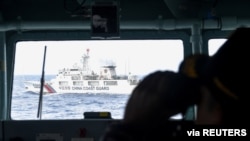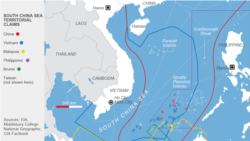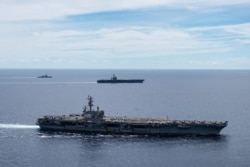Analysts are warning that China’s new law authorizing its coast guard to fire on foreign vessels in the disputed South China Sea will target five other Asian governments that have competing maritime claims and growing support from Beijing’s superpower rival, Washington.
The National People’s Congress standing committee in Beijing passed a law January 22 that expressly lets the coast guard use force. The law prescribes “all necessary means” to stop foreign vessels, including use of weapons aboard Chinese ships.
The coast guard fleet of about 200 boats regularly encounters vessels from Malaysia, the Philippines and Vietnam, three countries with rival sovereignty claims in the resource-rich South China Sea that extends from Hong Kong south to Indonesia.
The U.S. Navy regularly passes warships through the 3.5 million-square-kilometer waterway to warn China, a former Cold War foe, and show support for the Southeast Asian claimants. China cites historical records to back its claim to about 90% of the sea. Other countries believe China's claims violate international maritime laws.
“Using guns and real force against others will be against Vietnam and the Philippines and Malaysia in the South China Sea because of the sheer imbalance of power in favor of China,” said Alexander Vuving, professor at the Daniel K. Inouye Asia-Pacific Center for Security Studies in Hawaii. “Big guns” on the Chinese coast guard ships would intimidate the Southeast Asian states, he said.
The three Southeast Asian countries, plus quieter claimants Brunei and Taiwan, resent China for its expansion at sea, especially in the heavily contested Paracel and Spratly islands. China, backed by the strongest armed forces in Asia and the third most powerful worldwide, has built up some of the islets that Southeast Asian states call their own. The surrounding sea is prized for fisheries and undersea fuel reserves.
Philippine National Defense Secretary Delfin Lorenzana said China’s coast guard law raises the risk of "miscalculation" at sea, domestic media outlets said. A Vietnamese Foreign Affairs Ministry spokeswoman reacted to China’s move by urging all countries to follow international laws.
Vietnamese sailors died in 1974 and 1988 in military clashes with China. The two countries rammed each other’s boats in 2014 when Beijing authorized placement of a Chinese oil rig in disputed waters. China and the Philippines entered a standoff in 2012 as the Chinese side took control of a shoal west of Luzon Island. China and Malaysia were locked in their own standoff in early 2020.
Southeast Asian claimants also shadow Chinese ships that pass near the contested islets and repel Chinese fishing vessels.
Chinese resentment has grown because of U.S. support for the Southeast Asian claimants including regular warship movement in the South China Sea — such as U.S. carrier group exercises earlier this month. Washington, which does not claim the sea, helps train Philippine troops and in 2016 it authorized sales of lethal weapons to Vietnam. Taiwan already buys advanced U.S. arms.
“I think the PLA [China’s People’s Liberation Army] is playing that game of uncertainty in the minds of everyone else, so that uncertainty claims a buffer of 'don’t take precipitate action in these territories, because we have this option,'” said Eduardo Araral, associate professor at the National University of Singapore's public policy school.
In Beijing, Standing Committee Chairman Li Shanzhu said the coast guard law “provides legal guarantees for effectively safeguarding national sovereignty, security and maritime rights and interests,” according to the official Xinhua News Agency.
China’s coast guard has the largest ships of any patrol force in the world, but it cannot match U.S. forces, Vuving said.
China hopes instead to reset relations with the administration of U.S. President Joe Biden after a rocky four years under former president Donald Trump, said Yun Sun, East Asia Program senior associate at the Stimson Center.
“The context of the great power competition in the past four years is already very negative,” Sun said. “If the Chinese have any expectation for improvement, overreaction at this point is not a good strategy.”







